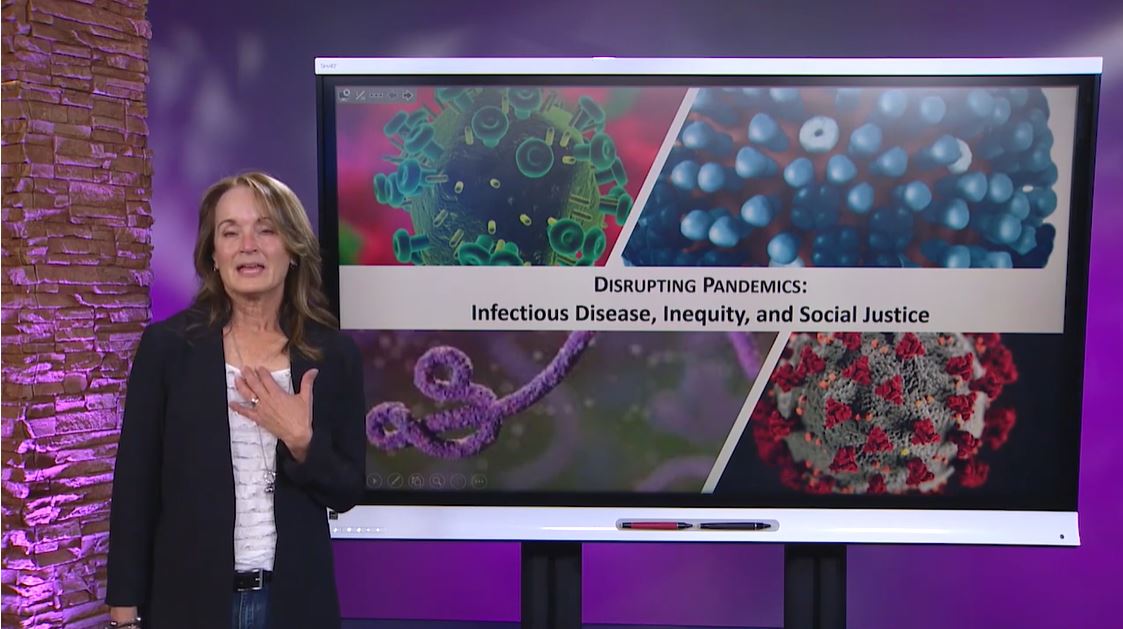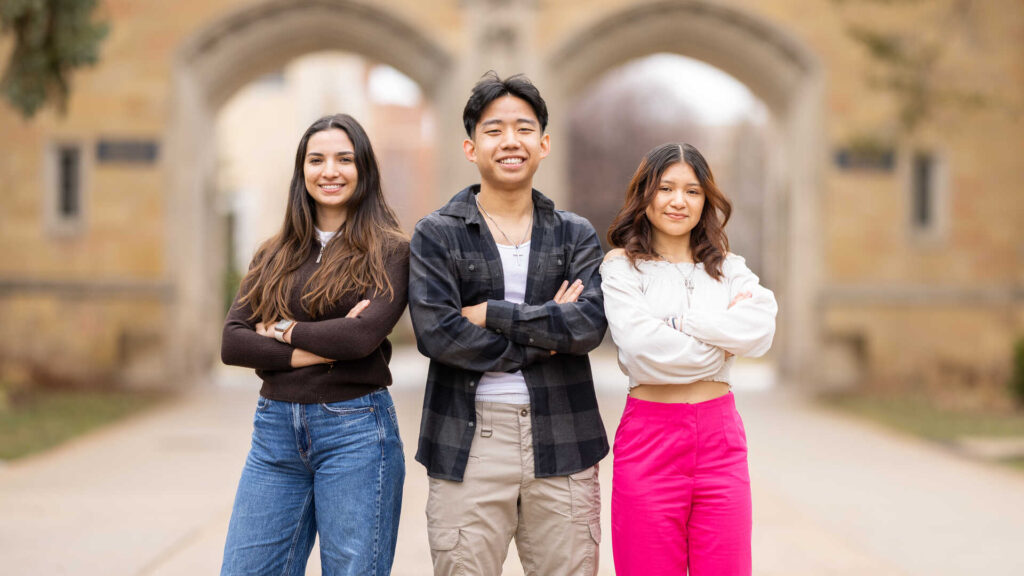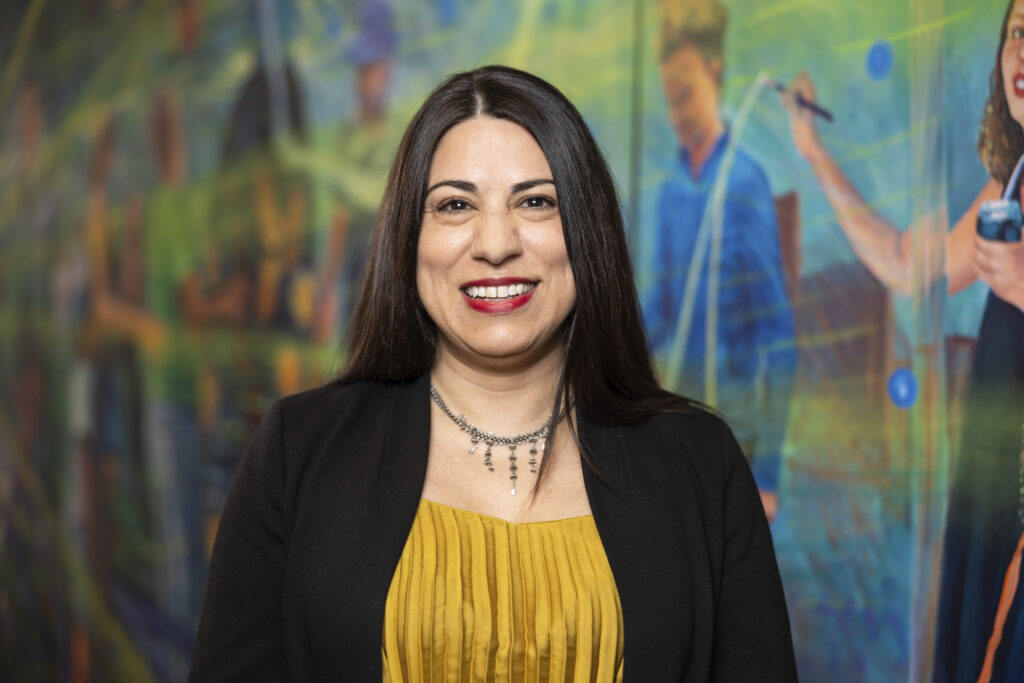While it may be global or everywhere, the COVID-19 pandemic is not impacting everyone the same, biology professor Jill Manske said.
Instead, COVID-19 has closely followed a historical pattern, where people of color shoulder a disproportionate burden of illness and death in pandemics, Manske said Feb. 23 in a kickoff presentation to the College of Arts and Sciences Teach-in Tuesday series focused on the theme "Disrupting Pandemics."
"Pandemics are not everywhere. They are lived very differently, by different people," she said paraphrasing Abigail Zuger, MD, who, in 2011, said: "Walk one block from hospitals on whose wards all hell is breaking loose and you would never know there is a problem."
The Centers for Disease Control and Prevention reports that COVID-19 cases are 2.5 times higher in Black Americans compared to white. Blacks are hospitalized at a rate nearly five times higher and mortality among Blacks is twice as high as it is among whites. According to the data, white populations fare better than all other races or ethnicities in these same metrics.
"This data represents the impact of racial capitalism, a form of racism," said St. Thomas sociology professor Amy Finnegan, who also presented for the series. She explained this is racialized exploitation and capital accumulation, which is a fundamental cause of the inequities and disadvantages impacting Blacks and other people of color and their outcomes with COVID-19.
Rabia, a student at St. Thomas, contracted COVID-19 last year. She said about 14 days into the illness: “I couldn’t even walk 10 steps without needing to catch my breath. My family would help me up the steps.” Manske invited her to speak during the presentation to illustrate the differences in lived experiences along racial lines.
When it was time to seek medical attention, Rabia said that as a Somali woman from Kenya, she and her family were nervous to seek care at an unfamiliar hospital near their suburban home because they have read about how at some hospitals Black people are not treated fairly or don't have their pain taken seriously. Rabia and her family felt more comfortable going to a hospital in Minneapolis situated where there is a higher Somali population. “Walking in, the first thing I noticed was the diverse staff; there were a lot of people of color, Black people, in particular, working at that hospital. It was good walking in and seeing that there was a diverse staff.”
Manske said pandemics like COVID-19 expose the social fault lines that leave some populations at greater risk for disease than others. Social circumstances like living conditions, access to health care and profession, Manske said, drive disease and lead to inequitable outcomes.
"When is social distancing a privilege?" Manske questioned, citing research showing Black workers are more than twice as likely as white workers to live in densely populated housing structures and more than twice as likely to live in households with multiple generations. This is due, in part, to historical structural racism that has limited where certain people can live and work.
Historically, pandemics and their spread have been blamed on the very communities that are most at risk, Manske said, adding that the impact of that kind of rhetoric is damaging.
Even today, while scientists don't know what caused COVID-19, when the first cases emerged in Wuhan, China, Manske said many jumped to conclusions, calling for the closure of Wuhan's wet markets.
"Think about these markets as essential sources of food for hundreds of millions of people, many of them poor, many of them without refrigeration," Manske said. "What would the impact be if we came in and just said, close the markets? What we're doing is putting our values and our needs ahead of folks who really need these kinds of resources."
The solution to leveling the socioeconomic playing field, explained Finnegan, is “we need to fundamentally transform relationships of power and dramatically redistribute resources by canceling debt, expanding unemployment insurance and Medicare, providing shelter for unhoused folks.” She added, “We need more, not less, public resources put into our hospitals and clinics and other social services that serve communities most impacted by COVID. Furthermore, we are going to need to dismantle white supremacy to dismantle racial capitalism.”
Professors Kim Vrudny and Fuad Naeem from the Theology Department also shared perspectives. View this presentation’s reading list online.
The next event in this series, “Incarceration and COVID-19: A Collision of Epidemics.” is scheduled for noon on March 23.







